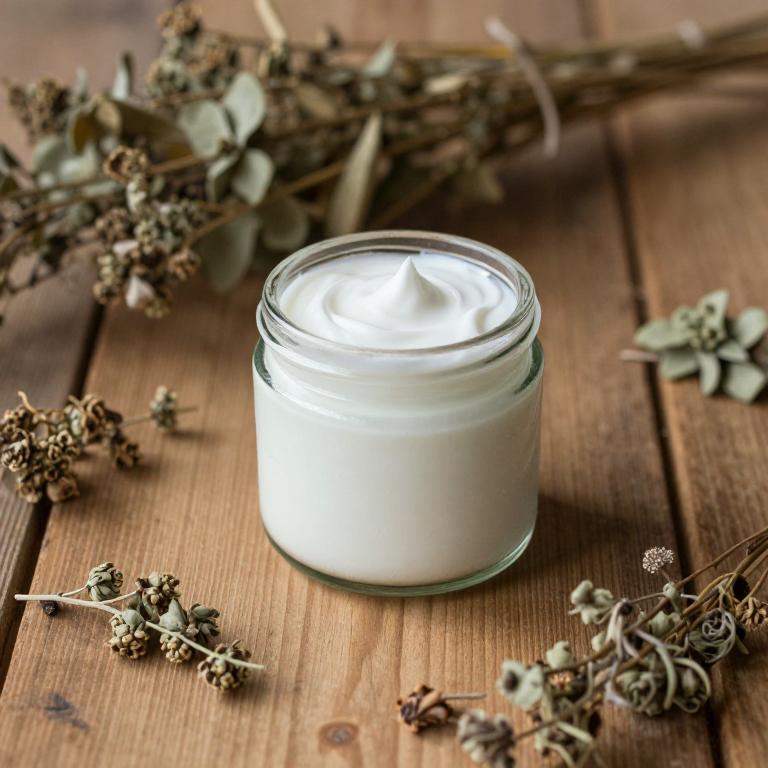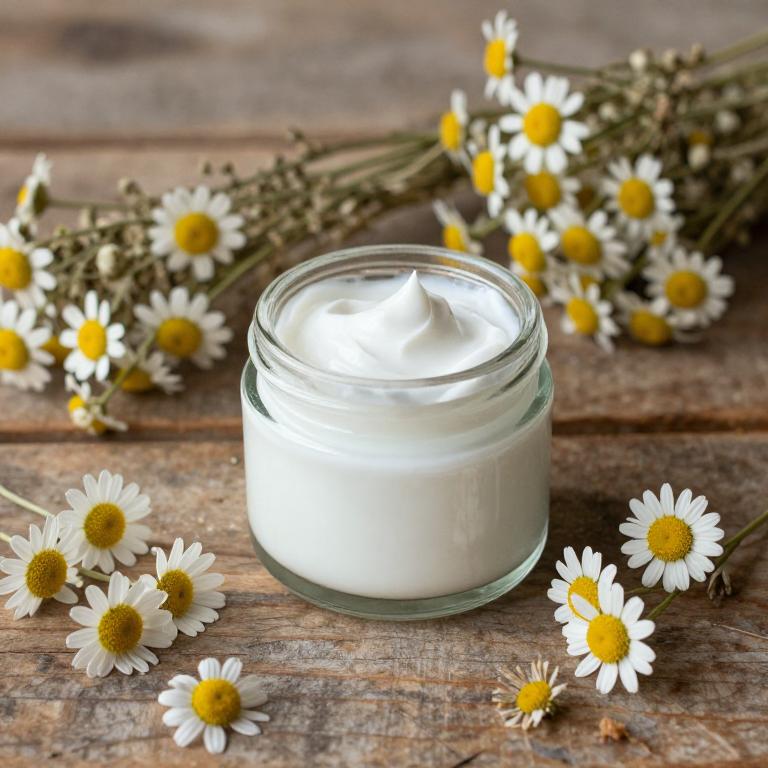10 Best Herbal Creams For Premenstrual Syndrome

Herbal creams for premenstrual syndrome (PMS) are topical treatments that incorporate natural ingredients believed to alleviate common symptoms such as bloating, cramps, and mood swings.
These creams often contain herbs like ginger, lavender, chamomile, and peppermint, which are known for their anti-inflammatory, calming, and pain-relieving properties. They are generally considered safe for most people, though individual reactions can vary, and it is advisable to perform a patch test before full application. While herbal creams may offer mild relief, they are typically used as complementary therapy alongside other PMS management strategies.
As with any natural remedy, consulting a healthcare professional is recommended to ensure they are appropriate for an individual's specific health needs.
Table of Contents
- 1. Chaste tree (Vitex agnus-castus)
- 2. Black cohosh (Cimicifuga racemosa)
- 3. Stinging nettle (Urtica dioica)
- 4. Chamomile (Matricaria chamomilla)
- 5. Dog rose (Rosa canina)
- 6. Ginger (Zingiber officinale)
- 7. St. john's wort (Hypericum perforatum)
- 8. Yarrow (Achillea millefolium)
- 9. English lavender (Lavandula angustifolia)
- 10. Turmeric (Curcuma longa)
1. Chaste tree (Vitex agnus-castus)

Vitex agnus-castus, commonly known as chasteberry, is a traditional herbal remedy that has been used for centuries to support hormonal balance and alleviate symptoms of premenstrual syndrome (PMS).
Herbal creams containing vitex agnus-castus are designed to be applied topically, offering a natural alternative for women seeking relief from PMS-related discomfort such as bloating, mood swings, and breast tenderness. These creams are often formulated with additional soothing ingredients like evening primrose oil or calendula to enhance their calming and anti-inflammatory effects. While research on the efficacy of topical vitex creams is limited, some studies suggest that oral vitex supplements may help regulate menstrual cycles and reduce PMS symptoms.
As with any herbal product, it is important to consult with a healthcare provider before use, especially for those with known allergies or taking other medications.
2. Black cohosh (Cimicifuga racemosa)

Cimicifuga racemosa, commonly known as black cohosh, is a herbal remedy that has been traditionally used to alleviate symptoms of premenstrual syndrome (PMS).
Herbal creams containing cimicifuga racemosa are formulated to target common PMS symptoms such as breast tenderness, mood swings, and bloating by potentially modulating hormonal activity. These topical applications may provide localized relief, reducing inflammation and discomfort in the breast area without the systemic effects of oral medications. While some studies suggest that cimicifuga racemosa may help manage PMS symptoms, more research is needed to confirm its efficacy and safety.
As with any herbal remedy, it is important to consult with a healthcare provider before use, especially for individuals with hormone-sensitive conditions or those taking other medications.
3. Stinging nettle (Urtica dioica)

Urtica dioica, commonly known as stinging nettle, has been used in traditional medicine for its potential therapeutic properties.
Herbal creams containing urtica dioica are increasingly being explored for their possible benefits in alleviating symptoms of premenstrual syndrome (PMS). These creams may help reduce inflammation and provide a natural alternative to conventional treatments. Some studies suggest that the anti-inflammatory and antioxidant compounds in stinging nettle could support hormonal balance and ease PMS-related discomfort.
However, more clinical research is needed to fully establish their efficacy and safety for this specific use.
4. Chamomile (Matricaria chamomilla)

Matricaria chamomilla, commonly known as German chamomile, is often used in herbal creams to alleviate symptoms of premenstrual syndrome (PMS).
These creams typically contain chamomile extract, which is valued for its anti-inflammatory and calming properties. The application of chamomile-based creams can help reduce cramping, bloating, and skin irritation associated with PMS. Studies suggest that the essential oils in chamomile may have a soothing effect on the body, promoting relaxation and easing discomfort.
While more research is needed, many women find these natural remedies beneficial as a complementary approach to managing PMS symptoms.
5. Dog rose (Rosa canina)

Rosa canina, commonly known as rosehip, is a natural ingredient often used in herbal creams for its anti-inflammatory and skin-renewing properties.
These creams are increasingly being explored for their potential benefits in alleviating symptoms of premenstrual syndrome (PMS), such as bloating, mood swings, and skin irritation. The high concentration of essential fatty acids in rosehip oil may help reduce inflammation and support hormonal balance, which are key factors in PMS. Some studies suggest that topical application of rosa canina creams can improve skin texture and reduce discomfort associated with hormonal fluctuations.
While more research is needed, many users report positive effects, making rosa canina creams a promising complementary therapy for managing PMS symptoms.
6. Ginger (Zingiber officinale)

Zingiber officinale, commonly known as ginger, has been traditionally used for its medicinal properties, and recent studies suggest that ginger-based herbal creams may offer relief for symptoms of premenstrual syndrome (PMS).
These creams typically contain extracts of fresh or dried ginger root, which are believed to possess anti-inflammatory and analgesic properties. When applied topically, ginger creams may help reduce menstrual cramps, bloating, and mood swings associated with PMS by improving blood circulation and reducing muscle tension. Some research indicates that the active compounds in ginger, such as gingerol and shogaol, may interact with hormonal pathways to alleviate PMS symptoms.
While more clinical trials are needed, many women find ginger herbal creams to be a natural and effective complementary therapy for managing PMS discomfort.
7. St. john's wort (Hypericum perforatum)

Hypericum perforatum, commonly known as St. John's wort, is a herbal remedy that has been traditionally used for its potential mood-enhancing properties.
When formulated into creams, hypericum perforatum may offer topical relief for symptoms associated with premenstrual syndrome (PMS), such as cramps and discomfort. While some studies suggest that topical applications of St. John's wort may have anti-inflammatory and analgesic effects, more research is needed to confirm its efficacy for PMS specifically. It is important to consult with a healthcare provider before using these creams, especially as they may interact with other medications.
Despite its traditional use, the safety and optimal application methods for hypericum perforatum creams in the context of PMS remain areas of ongoing investigation.
8. Yarrow (Achillea millefolium)

Achillea millefolium, commonly known as yarrow, has been traditionally used in herbal medicine for its potential benefits in alleviating symptoms of premenstrual syndrome (PMS).
When incorporated into herbal creams, it may help reduce inflammation and ease cramping associated with menstrual discomfort. These creams often combine yarrow with other herbs like chamomile or calendula to enhance their soothing and anti-inflammatory properties. Some studies suggest that yarrow may support hormonal balance, which can help manage mood swings and bloating linked to PMS.
However, while anecdotal evidence supports its use, more rigorous scientific research is needed to fully confirm its efficacy and safety for PMS relief.
9. English lavender (Lavandula angustifolia)

Lavandula angustifolia, commonly known as English lavender, is often used in herbal creams to alleviate symptoms of premenstrual syndrome (PMS).
These creams typically contain lavender essential oil, which is known for its calming and anti-inflammatory properties. Studies suggest that the soothing effects of lavender can help reduce cramping, mood swings, and breast tenderness associated with PMS. The aromatic compounds in lavender may also promote relaxation and improve sleep quality, which are commonly affected during the premenstrual phase.
While more research is needed, many women find relief from using lavender-based creams as a natural and holistic approach to managing PMS symptoms.
10. Turmeric (Curcuma longa)

Curcuma longa, commonly known as turmeric, has been increasingly studied for its potential benefits in alleviating symptoms of premenstrual syndrome (PMS).
The active compound in turmeric, curcumin, possesses anti-inflammatory and antioxidant properties that may help reduce menstrual cramps, mood swings, and bloating associated with PMS. Some herbal creams infused with curcuma longa are being used topically to provide localized relief from pelvic pain and inflammation. While research is still emerging, preliminary studies suggest that these creams may offer a natural alternative for managing PMS symptoms.
However, more clinical trials are needed to fully understand their efficacy and safety for long-term use.